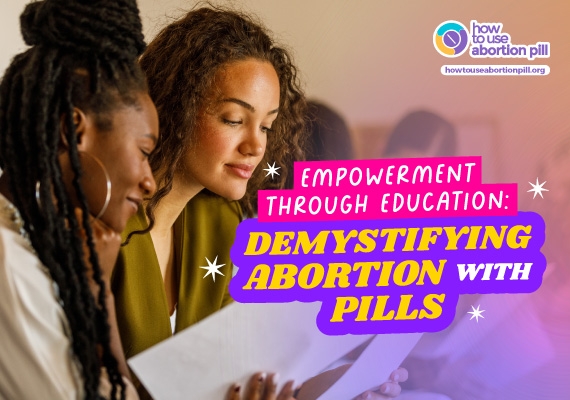Abortion with pills is a safe way to have an abortion at home. Thousands of women around the world have abortions with pills. However, there is also a lot of misinformation linked to abortion with pills, which has serious consequences for sexual and reproductive health as it can be difficult to distinguish false information from facts. In this blog, we will address this challenge by raising awareness and empowering ourselves so that we can make choices that suit our needs.
Facts about abortion with pills
Let’s take a look at some of the most common misconceptions about abortion pills and what the facts are.
Fact 1: Abortion with pills do not cause infertility
This popular belief often stems from misunderstandings about how abortion pills work. Medical research and evidence consistently show that abortion pills do not pose a risk to future fertility. These pills primarily work by blocking the hormone progesterone, which is essential for maintaining pregnancy. Once the pregnancy is terminated, the body typically returns to its normal reproductive function.
Fact 2: Abortion pills are not the same as emergency contraception.
While both abortion pills and emergency contraception pills are used to prevent or end pregnancy, they serve different purposes and are administered at different times. Abortion pills are taken after pregnancy has already occurred to terminate it, whereas emergency contraception pills are taken shortly after unprotected sex to prevent pregnancy from happening in the first place. It’s important for individuals to understand the distinction between the two and be well-informed to determine the most appropriate option for their situation.
Fact 3: Abortion pills are safe to use.
When administered according to medical guidelines, abortion pills are safe and effective. Serious complications are rare, and there are options to mitigate any discomfort or risks.
Fact 4: Abortion with pills elicits different feelings for users.
The experience of taking abortion pills can vary from person to person. While some individuals may experience cramping and bleeding similar to a heavy menstrual period, others may have a less uncomfortable experience.
Fact 5: Abortion pills are for pregnancies up to 13 weeks old.
Abortion pills are effective for terminating pregnancies up to 13 weeks of gestation. They can be used safely and effectively within this timeframe. It’s important for individuals to be aware of their pregnancy’s duration to determine the most appropriate timing for their situation.
Fact 6: Abortion with pills is for women of all ages.
The misconception that abortion with pills is only for young women overlooks the fact that women of all ages choose to use abortion pills as a safe and effective method of terminating a pregnancy, depending on their individual circumstances and medical advice. It’s essential to recognize that reproductive health decisions are personal and can vary widely among individuals, regardless of age.
Myths, not Abortion Pills, are Dangerous
Myths about abortion pills perpetuate false beliefs and misinformation, leading individuals to make decisions based on inaccurate information rather than facts and evidence. This contributes to confusion and fear surrounding abortion, hindering individuals’ ability to make informed choices about their reproductive health.
Such misinformation also creates barriers to access by dissuading individuals from seeking abortion care or delaying care due to unfounded concerns about safety, efficacy, or consequences. This can result in individuals facing unnecessary obstacles to accessing timely and appropriate reproductive healthcare, potentially leading to negative health outcomes.
The stigmatization of individuals who seek abortion care is also an outcome of myths about abortion. Stigma leads to social isolation, discrimination, and shame, preventing individuals from seeking support or sharing their experiences openly. This has detrimental effects on individuals’ mental health and well-being.
On the other hand, myths also cause challenges for healthcare providers in providing accurate information and care. Misconceptions held by patients or within the community create communication barriers, erode trust in healthcare providers, and impede the delivery of patient-centered care.
Empowerment Through Education
The most effective way to fight misinformation is through comprehensive sexual and reproductive health education, as education empowers individuals to make informed choices. When people have access to accurate information about abortion, including how it works, its safety, and its legality, they are better equipped to make decisions that align with their needs.
Access to accurate information about abortion ensures that individuals understand the importance of seeking safe abortion care. This knowledge helps prevent individuals from resorting to unsafe methods of abortion, which can lead to serious health complications.
Comprehensive sexual and reproductive health education also addresses systemic barriers to accessing abortion care, such as financial constraints, geographic location, and legal restrictions. By understanding their rights and available resources, individuals are better equipped to navigate these barriers and access the care they need.
On a broader level, education fosters respect for diverse experiences and perspectives surrounding abortion. It acknowledges that individuals have different circumstances and needs that influence their decisions about abortion. By promoting open and respectful dialogue, education encourages empathy and understanding across diverse communities.
